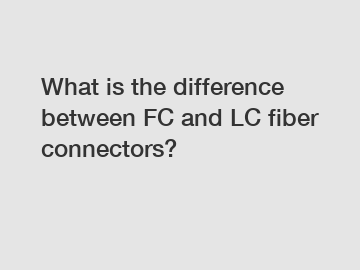What is the difference between FC and LC fiber connectors?
What is the difference between FC and LC fiber connectors?
Fiber optic technology has revolutionized the way data is transmitted, providing faster speeds and greater bandwidth compared to traditional copper cables. One crucial component of any fiber optic network is the connector, which plays a vital role in ensuring a secure and efficient connection between fibers. Two commonly used fiber connectors are the FC (Fiber Connector) and the LC (Lucent Connector). While both serve the same purpose, they differ in several key aspects. Let's delve into the details to understand the dissimilarities between FC and LC fiber connectors.
1. Form Factor:

The first noticeable distinction between FC and LC connectors lies in their physical appearance. FC connectors have a cylindrical shape with a screw-on mechanism for securing the connection. On the other hand, LC connectors feature a compact, rectangular form factor. The LC connector's small size makes it an ideal choice when space is limited or when multiple connectors need to be installed in a dense area.
2. Connection Mechanism:
The second essential difference between FC and LC fiber connectors is their connection mechanism. FC connectors have a threaded design that requires rotation to ensure a tight connection. This threaded mechanism makes FC connectors relatively more secure against accidental disconnections. In contrast, LC connectors utilize a push-pull mechanism for connection and disconnection, which offers quick and easy installation but is less resistant to unintended unplugging.
3. Insertion Loss:
Insertion loss, commonly referred to as signal loss, is an important factor to consider in any fiber optic connection. It refers to the loss of signal power when light passes through the connector. When comparing FC and LC connectors, LC connectors typically exhibit lower insertion loss compared to FC connectors. This difference is primarily due to the smaller ferrule size of LC connectors, which allows for better alignment and reduces light loss.
4. Ease of Use:
Another aspect to consider when choosing between FC and LC connectors is their ease of use. LC connectors are known for their plug-and-play simplicity, making them popular in environments where frequent connection changes are required. The push-pull mechanism of LC connectors allows for effortless and quick installation. On the other hand, FC connectors may be more suitable for applications where stability and security are prioritized, but they generally require more time and effort to connect and disconnect.
To summarize, while both FC and LC fiber connectors serve the same purpose of connecting fiber optic cables, they possess distinct qualities that make them better suited for different scenarios. The choice between FC and LC connectors depends on the specific requirements of the network or application.
In summary, FC and LC fiber connectors differ in their physical form factor, connection mechanism, insertion loss, and ease of use. FC connectors are cylindrical with a threaded design, providing a secure connection at the cost of ease of installation. LC connectors, on the other hand, have a compact form factor, utilize a push-pull mechanism for easy installation, and offer lower insertion loss due to their smaller ferrule size. Ultimately, selecting the appropriate connector depends on the specific needs of the network and the trade-offs between security, ease of use, and signal loss that are acceptable for the application.
Want more information on Butterfly Fiber Optic Cables, Audio patch cords, China Usb Cables? Feel free to contact us.

Comments